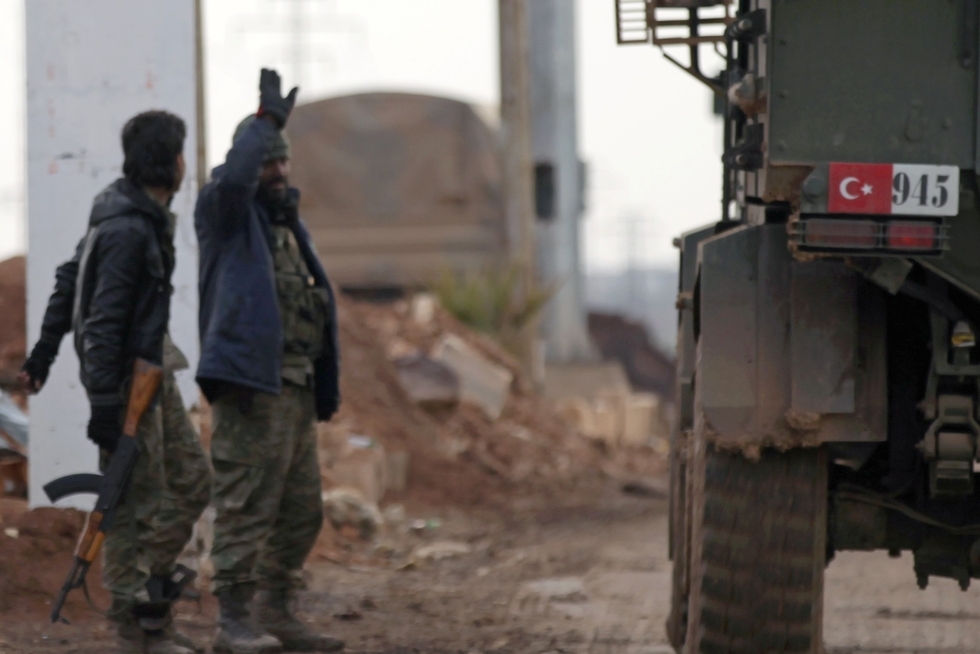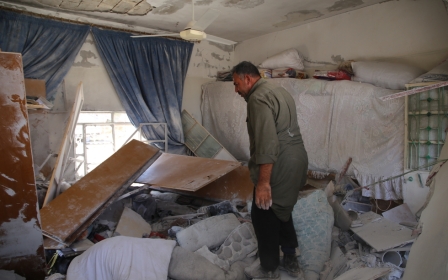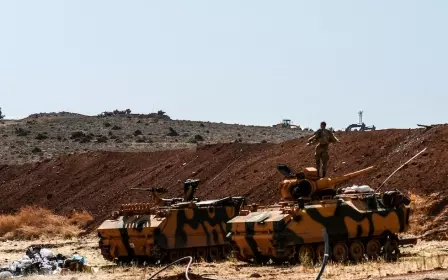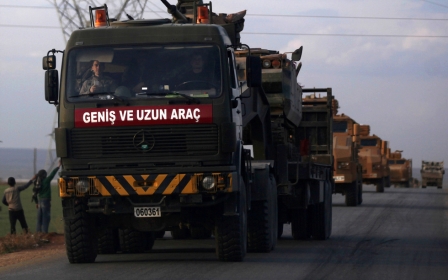Turkey's dilemma in Idlib: Defeating the Kurds and taming rebel groups

The unthinkable happened this week. Saudi Foreign Minister Adel al-Jubeir met with Russian President Vladimir Putin and issued a joint declaration pledging support for Syria's territorial integrity and the preservation of state institutions.
That the two would have met at all - let alone to discuss cooperation in Syria - was unimaginable only a few months ago.
Such, however, has been the trajectory of the Syrian conflict.
After the Russian intervention in the Syrian war so decisively shifted the military balance in favour of the pro-regime forces, regional actors have been forced to adjust to the new realities and the framework created in Astana to de-escalate the conflict - although certainly not a peace agreement in any way.
Saudi Arabia is not alone in its adjustment. Turkey, once the most ardent material supporter of the various factions of the armed and political opposition, has emerged alongside Russia and Iran as one of the guarantors of Syria's post-conflict future.
The future of armed groups
The designs of the tripartite agreement about Syria’s future are today being implemented. Idlib, the last major bastion under armed rebel control, has been targeted by Turkey for cleansing of armed groups and for the implementation of a de-escalation zone.
Intent on preventing a "terrorist corridor" on its border, Turkey has taken the military lead in Idlib and adopted a "Russia outside, Turkey inside" policy in which it will assume control and responsibility for Idlib.
Just on Monday, the intervention into the province began with Turkish shelling in support of Free Syrian Army (FSA) advances against armed groups.
One of the central questions is what this may mean for the future of the armed groups, especially the Islamist groups represented by Hayat Tahrir al-Sham (HTS), Jabhat al-Nusra’s successor. Will the Turkish intervention to create a de-escalation zone in Idlib spell the final death knell of the Islamist armed opposition?
Turkey's calculations in Syria are predominantly, if not exclusively, understood through the lens of the Kurdish issue
This is unlikely because the presence of armed elements, especially those such as HTS and the remnants of FSA brigades, who are connected to Turkey, can be mobilised to support Turkish policies against Kurdish plans for creating contiguous territory in the hopes of future autonomy or independence from Syria.
The goal is de-escalation, which assumes the continued presence of armed groups throughout the country. What we are likely to see develop in the coming weeks then is a serious degradation of HTS and FSA capacity as well as a cleansing of armed Kurdish groups from Afrin, the Kurdish island in Idlib province. This, rather than HTS, is more central to Turkey's plans.
Syrian civilians, caught in the middle of such internecine conflict for years, will - throughout these operations- continue to be subject to violence, bombardment, and displacement.
The Kurdish issue
Turkey's calculations in Syria are predominantly, if not exclusively, understood through the lens of the Kurdish issue. There is agreement with the regime and its allies that the Rojava project will not morph into an independent state or even a powerful, de-centralised fragment of a weakened Syrian entity. Just last year, Turkey mobilised the FSA to prevent the People's Protection Units (YPG) and Islamic State (IS) advances along its border.
The FSA, long irrelevant and incapable of overrunning regime forces, has been rendered relevant and useful solely as Turkey's proxy force
Today, FSA brigades have encircled Afrin, a Kurdish enclave in Idlib province and are advancing, with Turkish military support, against Kurdish groups. Publicly, the Turkish government is revealing that its intervention to cleanse Idlib and create a de-escalation zone will be led by the FSA as their on-the-ground force, supported with Turkish aerial intervention, logistics, supplies, and intelligence.
The FSA, long irrelevant and incapable of overrunning regime forces, has been rendered relevant and useful solely as Turkey's proxy force.
Any military degradation of its former allies in Syria would thus severely compromise the Turkish policy of preventing Kurdish expansion and autonomy within Syria. The key question is thus not whether the Idlib operation will eliminate the Islamist groups once and for all, but whether Turkey, their erstwhile supporter, deems them as useful proxies in the fight against Kurdish expansion.
Whether Turkey can live solely with the FSA as its proxy will determine the extent to which the Idlib operation degrades HTS.
Turkey's dilemma
The question of what the operation means for the armed opposition must thus be understood within Turkey's current dilemma in Syria. On the one hand, Turkey is committed to the Astana process and has aligned itself - and its vision- for a post-conflict Syria alongside Russia, Iran and the Syrian regime.
As a guarantor of the agreement, Turkey is committed to extending the de-escalation zones throughout the country as a way to reduce violence, even in areas, such as Idlib, that were once predominantly under its influence.
Kurdish autonomy in Syria has proved more inimical to Turkish interests than the Syrian regime staying in power
On the other hand, Turkey is incapable - or unwilling - to engage in military actions on its own to prevent Kurdish expansion. Kurdish autonomy in Syria has proved more inimical to Turkish interests than the Syrian regime staying in power.
There is thus convergence in the tripartite visions for Syria: a reduction of violence coupled with thwarting Kurdish moves for autonomy. This requires concessions from all sides, including Turkey's abandonment of former allies, such as the HTS.
The challenge here is in rendering HTS invisible enough to satisfy its tripartite partners while retaining the ability to activate armed elements to prevent Kurdish expansion. This is a nearly impossible balancing act.
New reality
We are not witnessing the end of the Islamist groups today but their transformation and reorganisation in accordance with Syria's new realities. No longer is the overthrow of the regime a realistic goal for the armed groups. To remain relevant, they have had to adjust and surrender themselves to the strategic goals of their patrons. Whether HTS and its elements are willing to do so willingly remains to be seen.
Armed groups in Syria have proven themselves quite adaptable to the conflict landscape. They are certainly not as powerful as they once were, but they are likely to remain present, if not entirely relevant, for years to come. The very notion of a de-escalation zone, which Turkey seeks to implement in Idlib, is an admission of this reality.
- Samer Abboud is an Associate Professor of International Studies at Arcadeia University and the author of Syria (Polity). He is currently a Visiting Scholar at Villanova University's Centre for Arab and Islamic Studies.
The views expressed in this article belong to the author and do not necessarily reflect the editorial policy of Middle East Eye.
Photo: Free Syrian Army fighters gesture as Turkish military vehicles drive in the Syrian rebel-held town of al-Rai while heading towards the northern Syrian city of al-Bab, Syria January 9 2017 (Reuters)
This article is available in French on Middle East Eye French edition.
Middle East Eye propose une couverture et une analyse indépendantes et incomparables du Moyen-Orient, de l’Afrique du Nord et d’autres régions du monde. Pour en savoir plus sur la reprise de ce contenu et les frais qui s’appliquent, veuillez remplir ce formulaire [en anglais]. Pour en savoir plus sur MEE, cliquez ici [en anglais].






